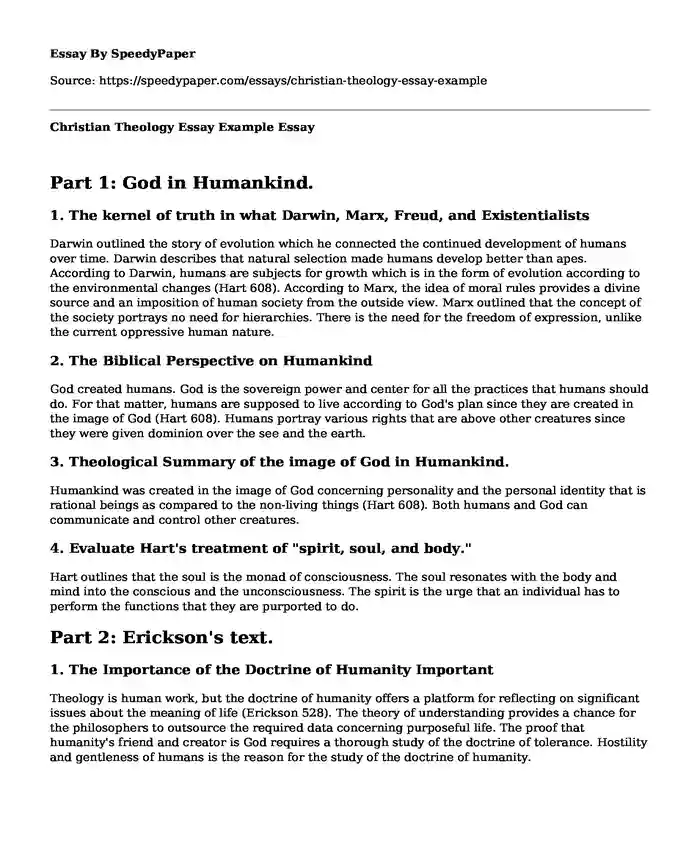
| Type of paper: | Term paper |
| Categories: | Christianity Bible |
| Pages: | 3 |
| Wordcount: | 690 words |
Part 1: God in Humankind.
1. The kernel of truth in what Darwin, Marx, Freud, and Existentialists
Darwin outlined the story of evolution which he connected the continued development of humans over time. Darwin describes that natural selection made humans develop better than apes. According to Darwin, humans are subjects for growth which is in the form of evolution according to the environmental changes (Hart 608). According to Marx, the idea of moral rules provides a divine source and an imposition of human society from the outside view. Marx outlined that the concept of the society portrays no need for hierarchies. There is the need for the freedom of expression, unlike the current oppressive human nature.
2. The Biblical Perspective on Humankind
God created humans. God is the sovereign power and center for all the practices that humans should do. For that matter, humans are supposed to live according to God's plan since they are created in the image of God (Hart 608). Humans portray various rights that are above other creatures since they were given dominion over the see and the earth.
3. Theological Summary of the image of God in Humankind.
Humankind was created in the image of God concerning personality and the personal identity that is rational beings as compared to the non-living things (Hart 608). Both humans and God can communicate and control other creatures.
4. Evaluate Hart's treatment of "spirit, soul, and body."
Hart outlines that the soul is the monad of consciousness. The soul resonates with the body and mind into the conscious and the unconsciousness. The spirit is the urge that an individual has to perform the functions that they are purported to do.
Part 2: Erickson's text.
1. The Importance of the Doctrine of Humanity Important
Theology is human work, but the doctrine of humanity offers a platform for reflecting on significant issues about the meaning of life (Erickson 528). The theory of understanding provides a chance for the philosophers to outsource the required data concerning purposeful life. The proof that humanity's friend and creator is God requires a thorough study of the doctrine of tolerance. Hostility and gentleness of humans is the reason for the study of the doctrine of humanity.
2. Erickson's Conclusions Concerning the Meaning of Human Creation.
Human creation is connected to people's view of the existence of God. Erickson 501) outlines that deistic evolution stands a chance for airing out the reason for describing issues concerning independent evolution (Erickson 528). According to Erickson, God exists and allows physical evolution to carry out its role in enhancing humanity.
3. Substantive, Relational, and Functional Views of the Image of God
Erickson outlines the substantive view of the image of God which he connects to the spiritual and psychological aspect. Substantive view aims at relating a historical perspective of God to the present aspects (Erickson 521). Image pertained to reason while likeness pertained to morality according to Erickson (522). Therefore, the substantive view agrees that God's image is explored in his variations. Relational view of God is a modernized perspective which is connected to the locus that is geared to the reason why Christ came to the earth. Functional aspects portray the image of God as an exercise of dominion which is over the concept of creation (Erickson 528).
4. "Conditional unity."
The soul is contained in the body of an individual during their life on earth. The unity between the soul and the body is disoriented even though their personhood remains. Resurrection restores the dissolution of the soul and the body thus enabling the individual to keep existing. My evaluation is that the body of a person and the soul are the same. The reason is that God did not specify that he made the soul and the body separately (Erickson 557).
5. Erickson's Meaning of the Universality of Humanity.
The universality of humanity is connected to the fact that human nature is not consistent with the teachings that are based on the scriptures. Personal consciousness and the existence of death and resurrection delineates the discourse of conditional unity.
Works Cited
Erickson, Millard J. Christian Theology, 3rd ed. Grand Rapids, MI: Baker, 2013.
Larry D. Hart, Truth Aflame: Theology for the Church in Renewal, rev. Ed. (Grand Rapids, MI: Zondervan, 2005), 608.
Cite this page
Christian Theology Essay Example. (2022, Jun 27). Retrieved from https://speedypaper.net/essays/christian-theology-essay-example
Request Removal
If you are the original author of this essay and no longer wish to have it published on the SpeedyPaper website, please click below to request its removal:
- Essay Example Containing Several Ways to Motivate Yourself to Study
- Reaching Higher Levels Language Proficiency, Free Paper Sample
- Identification of Communication Challenges in Education. Essay Sample.
- The Monster Within - Essay Example on Deviance
- Free Essay Example: My First Car
- Case Study Example for You: Motivation and Leadership Strategies
- Free Essay Example - Malthusianism
Popular categories




